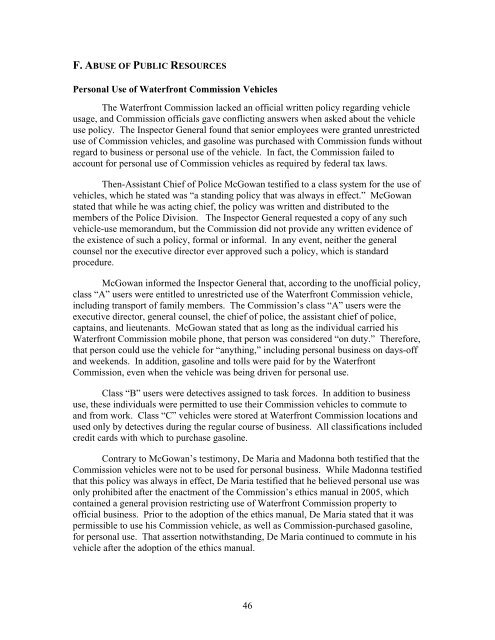Investigation of the Waterfront Commission of New York Harbor
Investigation of the Waterfront Commission of New York Harbor
Investigation of the Waterfront Commission of New York Harbor
You also want an ePaper? Increase the reach of your titles
YUMPU automatically turns print PDFs into web optimized ePapers that Google loves.
F. ABUSE OF PUBLIC RESOURCESPersonal Use <strong>of</strong> <strong>Waterfront</strong> <strong>Commission</strong> VehiclesThe <strong>Waterfront</strong> <strong>Commission</strong> lacked an <strong>of</strong>ficial written policy regarding vehicleusage, and <strong>Commission</strong> <strong>of</strong>ficials gave conflicting answers when asked about <strong>the</strong> vehicleuse policy. The Inspector General found that senior employees were granted unrestricteduse <strong>of</strong> <strong>Commission</strong> vehicles, and gasoline was purchased with <strong>Commission</strong> funds withoutregard to business or personal use <strong>of</strong> <strong>the</strong> vehicle. In fact, <strong>the</strong> <strong>Commission</strong> failed toaccount for personal use <strong>of</strong> <strong>Commission</strong> vehicles as required by federal tax laws.Then-Assistant Chief <strong>of</strong> Police McGowan testified to a class system for <strong>the</strong> use <strong>of</strong>vehicles, which he stated was “a standing policy that was always in effect.” McGowanstated that while he was acting chief, <strong>the</strong> policy was written and distributed to <strong>the</strong>members <strong>of</strong> <strong>the</strong> Police Division. The Inspector General requested a copy <strong>of</strong> any suchvehicle-use memorandum, but <strong>the</strong> <strong>Commission</strong> did not provide any written evidence <strong>of</strong><strong>the</strong> existence <strong>of</strong> such a policy, formal or informal. In any event, nei<strong>the</strong>r <strong>the</strong> generalcounsel nor <strong>the</strong> executive director ever approved such a policy, which is standardprocedure.McGowan informed <strong>the</strong> Inspector General that, according to <strong>the</strong> un<strong>of</strong>ficial policy,class “A” users were entitled to unrestricted use <strong>of</strong> <strong>the</strong> <strong>Waterfront</strong> <strong>Commission</strong> vehicle,including transport <strong>of</strong> family members. The <strong>Commission</strong>’s class “A” users were <strong>the</strong>executive director, general counsel, <strong>the</strong> chief <strong>of</strong> police, <strong>the</strong> assistant chief <strong>of</strong> police,captains, and lieutenants. McGowan stated that as long as <strong>the</strong> individual carried his<strong>Waterfront</strong> <strong>Commission</strong> mobile phone, that person was considered “on duty.” Therefore,that person could use <strong>the</strong> vehicle for “anything,” including personal business on days-<strong>of</strong>fand weekends. In addition, gasoline and tolls were paid for by <strong>the</strong> <strong>Waterfront</strong><strong>Commission</strong>, even when <strong>the</strong> vehicle was being driven for personal use.Class “B” users were detectives assigned to task forces. In addition to businessuse, <strong>the</strong>se individuals were permitted to use <strong>the</strong>ir <strong>Commission</strong> vehicles to commute toand from work. Class “C” vehicles were stored at <strong>Waterfront</strong> <strong>Commission</strong> locations andused only by detectives during <strong>the</strong> regular course <strong>of</strong> business. All classifications includedcredit cards with which to purchase gasoline.Contrary to McGowan’s testimony, De Maria and Madonna both testified that <strong>the</strong><strong>Commission</strong> vehicles were not to be used for personal business. While Madonna testifiedthat this policy was always in effect, De Maria testified that he believed personal use wasonly prohibited after <strong>the</strong> enactment <strong>of</strong> <strong>the</strong> <strong>Commission</strong>’s ethics manual in 2005, whichcontained a general provision restricting use <strong>of</strong> <strong>Waterfront</strong> <strong>Commission</strong> property to<strong>of</strong>ficial business. Prior to <strong>the</strong> adoption <strong>of</strong> <strong>the</strong> ethics manual, De Maria stated that it waspermissible to use his <strong>Commission</strong> vehicle, as well as <strong>Commission</strong>-purchased gasoline,for personal use. That assertion notwithstanding, De Maria continued to commute in hisvehicle after <strong>the</strong> adoption <strong>of</strong> <strong>the</strong> ethics manual.46


